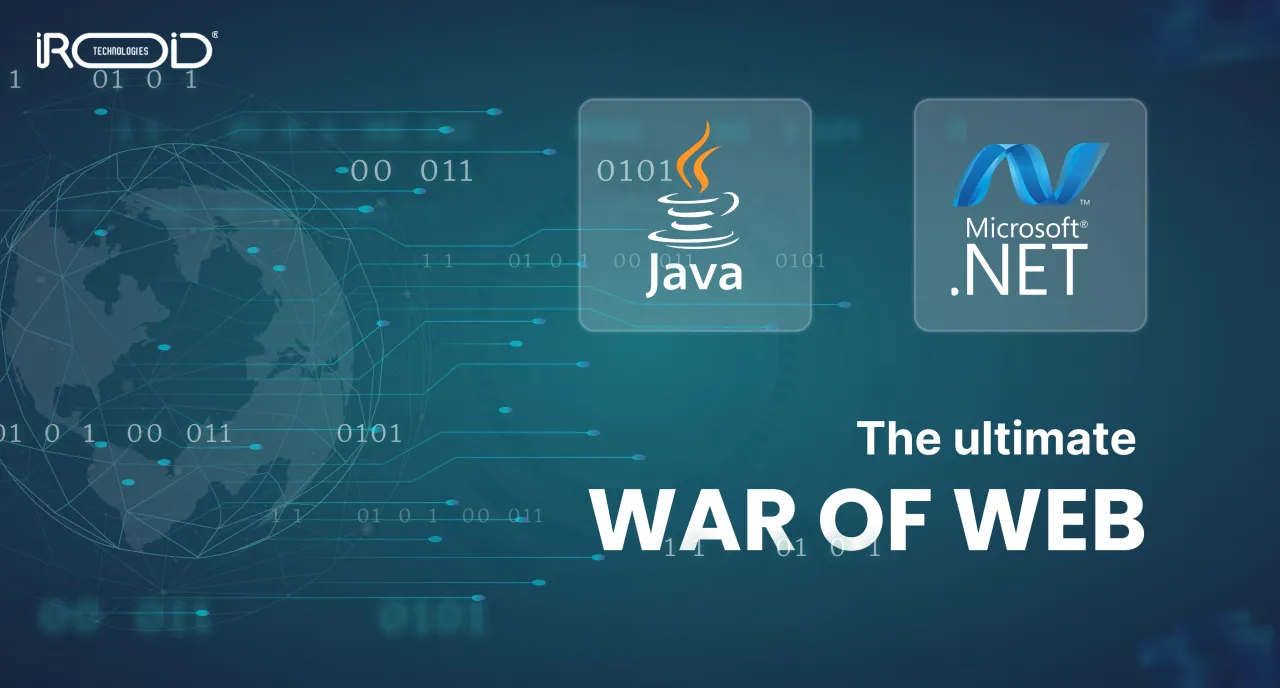.NET vs JAVA: The Ultimate War

.NET vs Java: An Overview
.NET
Microsoft designed the cross-platform, free, and open-source.NET framework. It allows programmers to construct cutting-edge, high-performance programs for Windows, Linux, and macOS. The The.NET framework is made up of a runtime, a framework, a class library, and a collection of tools that provide a wide variety of capabilities for developing web applications. When you engage ASP.NET developers, they may create web applications in C#, F#, or Visual Basic.
Java
Because of its reputation for dependability, security, and portability, Java is a popular platform for creating web applications. It is a well-known programming language developed by Sun Microsystems in 1995, which Oracle currently controls. It is a platform-independent object-oriented language. Java programs may run on any hardware or operating system that has a Java Virtual Machine (JVM) installed. Java has a broad ecosystem of tools and frameworks in addition to its core language; so, when you hire Java app developers India, they can quickly design web apps. Spring, Hibernate, and Struts are examples of popular frameworks. Java also has a large and active developer community, so those in need of help or those interested in learning more about the language may discover a variety of resources online.
Pros and Cons of .NET
Pros:
- Windows integration is strong: NET was designed for the Windows platform and offered a close connection with the operating system.
- Outstanding performance: Just-In-Time (JIT) compilation in .NET optimizes runtime performance, making it quicker than Java for running complicated algorithms.
- Simple to learn: .NET features a more integrated development environment (IDE) that allows for a more efficient programming experience.
- Strong security: The strength of.NET's security protocols is a major reason why many firms choose.NET for their projects.
- Language support is extensive: C#, Visual Basic, and F# are among the programming languages supported by .NET.
Cons:
- Platform independence is constrained: Although .NET Core offers support for other operating systems, its predominant focus remains on Windows technology.
- Exclusive technology: Some.NET capabilities require licenses, which can raise the overall cost of a project.
- Community support is limited: While the.NET community is vast and expanding, it is not as well established as the Java community.
- Scalability is limited: While .NET can manage high traffic levels, it is less scalable in terms of vertical scalability than Java.
- Language support is limited: While .NET supports numerous languages, it is less extensive than Java.
Pros and Cons of Java
Pros:
- Independence of platform: Java code is extremely portable because it can execute on any platform that has the Java Virtual Machine (JVM) installed.
- Strong community backing: Java has a big and active developer community, as well as a diverse set of libraries, frameworks, and tools for use in development.
- Strong security: Java's security features, such as built-in encryption and safe coding practices, are well-known and generally acknowledged.
- Outstanding scalability: Java is extremely scalable and can manage massive amounts of traffic and data.
- Language support is extensive: Java provides support for several programming languages, including Java, Kotlin, and Scala.
Also, read How to Choose a Good Java Development Partner.
Cons:
- The learning curve is challenging: Java is known for its complexity and requirement for extensive manual configuration, which can make it more demanding for beginners to become proficient in.
- Memory administration: If not properly optimized, Java's trash collection might create performance concerns.
- Windows integration is somewhat limited: Although Java is capable of running on the Windows platform, it lacks the same level of tight integration seen in .NET.
The Ultimate Battle: .NET vs Java
The most common programming languages for developing internet apps are Java and.NET. While they have many similarities, they also have major differences, which may make one technology stack better suited for a specific project than the other.
Let us compare.NET to Java:
Performance:
Java and .NET are both powerful programming languages. When running complex algorithms,.NET is frequently faster than Java, yet Java performs better when managing memory. While Java utilizes Just-In-Time (JIT) compilation as well as Ahead-Of-Time (AOT) compilation for even faster execution,.NET only uses JIT compilation to optimize performance during runtime.
Security:
Both .NET and Java have strong security features such as built-in encryption and safe coding practices. .NET has a higher security reputation because it is a closed environment and relies on Microsoft's security standards, which are famous for their strength.
Scalability:
Both .NET and Java are highly scalable systems with the ability to efficiently manage substantial volumes of traffic and data. However, Java is more suitable for vertical scaling, while .NET is more suitable for horizontal scaling. This means that a Java app development business can help you increase the capacity of existing servers, whereas .NET is better at adding additional servers to a system to handle increased traffic.
Ease of use:
In .NET and Java, a variety of tools, libraries, and frameworks are available to help with development. .NET, on the other hand, has a more integrated development environment (IDE), which simplifies programming. Java, on the other hand, is known for being more difficult and requiring more manual configuration.
Community Support
Both the.NET and Java developer communities are large and active, giving assistance, discussing best practices, and engaging in open-source efforts. Because Java has been around for a long time and has a larger developer community and accessible resources, it is easier to find technical answers and stay current on new breakthroughs in the industry.
Cost
When it comes to pricing, both Java and .NET offer advantages and disadvantages. Certain features, such as advanced security systems, need the purchase of a license. Java, on the other hand, is open-source and free, albeit it may need additional fees for enterprise-level capabilities or paid support. Microsoft's proprietary technology is known as .NET.
Platform Independence
Java is well-known for its "write once, run anywhere" approach, which claims that Java code may be executed on any platform that has the Java Virtual Machine (JVM). .NET, on the other hand, was originally designed for the Windows platform but has now expanded to support other operating systems via.NET Core.
Also, read The importance of website content in web design.
Language Support
Both .NET and Java offer a large variety of programming languages. .NET provides C#, Visual Basic, and F#, whereas Java supports Java, Kotlin, and Scala. Java support is predominantly focused on a single language, while .NET support encompasses multiple languages with a shared runtime and libraries, providing a more integrated approach.
Tooling
.NET and Java both provide a plethora of development-related tools, libraries, and frameworks. However, the.NET toolset is more integrated and provides a more seamless development experience. Although more complete, Java's tools may need more manual setup and configuration. As a result, while .NET and Java have many similarities, they also diverge. When deciding between the two, it's critical to analyze your project's unique demands and which technology stack best meets those objectives. Overall, both Java and .NET have advantages and disadvantages. When determining which technology stack to utilize for a project, it's critical to analyze its unique requirements and which technology stack best matches them.
Selecting the Most Appropriate Technology Stack for Your Web Application
Choosing the right technology stack for your web application may have a big influence on the project's success. There are various factors to consider while deciding between.NET and Java, including:
- Project specifications: The first step is to establish your project's particular requirements. Consider the complexity of the application, the scalability needs, system integration, and device compatibility.
- Team knowledge: Consider your development team's talents and expertise. If your team has .NET experience, this may be the ideal option for your project. Similarly, if your team has prior expertise with Java, it may be better appropriate for your project.
- Community assistance: Both.NET and Java have big and active communities that offer a wealth of assistance and resources. Consider the availability of third-party libraries, frameworks, and tools, as well as the regularity with which upgrades and new versions are released.
- Cost: The cost of selecting the correct technology stack for your project is crucial. Consider the licensing expenses, hardware requirements, and development costs for each technology.
- Compatibility: Check that the technology stack you've chosen is compatible with your existing systems and infrastructure. This covers operating systems, databases, and third-party applications.
The decision between .NET and Java ultimately depends on the specific requirements of your project and the level of experience of your development team. Before making a decision, carefully consider all of your alternatives and get guidance from an experienced development partner to guarantee that your web application is built to the highest standards.
Bottom Line
At first glance, comparing .NET with JAVA looks strange because the first is a framework and the second is a programming language. However, Java is now utilized as a foundation that supports important languages such as Python and Ruby. Both technologies have very similar applications and are especially useful for complicated tasks. Although Java boasts a larger community, extensive documentation, a larger pool of skilled professionals, and more career opportunities, .NET excels in performance and provides tools specifically designed for complex user interfaces. If you are still unsure about whether technology is appropriate for your project, contact us. Being one of the eminent web development companies in India, IROID TECHNOLOGIES can give advice or locate professionals in both technologies who will undoubtedly steer you in the proper route and look after your goods.

